
|
|
Issue Number 12 • Tuesday, March 5, 2024 |
Campus ChampionBekeh Ukelina, history and Africana studies professor, is balancing his research trip to Nigeria while coordinating activities for SUNY Cortland’s Women’s History Month. He believes that women possess a quiet power rarely celebrated and it’s the strength of the women in his life that shaped who he is. The Center for Gender and Intercultural Studies director, author and member of world heritage site task forces often finds himself in leadership roles. “Bringing people together for a common cause fuels my passion. I believe the essence of leadership is solving problems through simple and collaborative solutions, and that is what I always try to do.” Wednesday, March 6Women’s History Month Discussion: Sociologists with NYT Obituaries, presented by Emily Fedrizzi, Madison Hanford, Thomas Ellison and Lilly Liang, Old Main Colloquium, Room 0220, 12:30 to 1:20 p.m. Finding Your People: A mixer-style event will bring together students, faculty, and staff who are interested in disability related topics. The first event of a three-part series all about disability, agency and advocacy, Corey Union, Room 220, 4 to 6:30 p.m. Please RSVP. Get Resume Ready: Presented by Career Services, online, register on Handshake, 4:30 to 5:30 p.m. Thursday, March 7International Women’s Day Tabling: Presented by International Programs Office, outside Old Main, Room 219, 11:30 a.m. to 1:30 p.m. Monday, March 11 through Friday, March 15Spring Break Tuesday, March 12EAP Healthy Baked Potato Bar Lunch: Participants bring one topping for a potato to share, Park Center Hall of Fame Room, noon to 1 p.m. Wednesday, March 20Intro to Handshake and LinkedIn: Presented by Career Services, online, register on Handshake, 4 to 5 p.m. Braiding Sweetgrass Book Club: Corey Union, Room 209, 7 to 8 p.m. Thursday, March 21Women’s History Month Lecture: Devouring Refusal: Black Women’s Lineages Revisited from Combahee to Cunt, presented by M. Nicole Horsley, Distinguished Visiting Scholar, SUNY Buffalo, Old Main Colloquium, Room 0220, noon to 1 p.m. |
Lieutenant Governor talks service with students02/29/2024New York Lieutenant Governor Antonio Delgado visited SUNY Cortland recently to hear from students about the university’s wide-ranging community service efforts and how they can help inspire a new statewide initiative. Lt. Gov. Delgado spoke with 17 Cortland students representing nine student organizations ranging from student government to multicultural groups to the student-run emergency medical services squad. That student input will help inform the early development of New York’s Office of Service and Civic Engagement, a state office announced by Governor Kathy Hochul in January that Delgado is tasked with developing. “We were honored to host Lieutenant Governor Delgado for a visit and join an important statewide conversation about service and civic engagement,” said SUNY Cortland President Erik J. Bitterbaum of Lt. Gov. Delgado’s Feb. 28 visit. “I was particularly impressed with the number of our Cortland students who showed up to share their experiences related to community service. They represent some of our brightest minds, and I am very happy they were able to share their ideas with the lieutenant governor.” The initial focus of the lieutenant governor’s new initiative involves building partnerships with SUNY institutions to help create an inaugural class of the Empire State Service Program, which will provide paid work opportunities to college students as a way of serving their community. “I think service is the most organic and most natural way to get us back to understanding what it means to care for each other, to love each other,” Delgado told students. During the informal roundtable discussion, the lieutenant governor spoke candidly for more than an hour with student leaders in a Student Life Center classroom. He shared his own background and his winding journey to politics: growing up in a working-class family in Schenectady, engaging in activism work at Colgate University, attending Harvard Law School and then pursuing an unconventional career in rap music before eventually starting a career in corporate law. In that legal work, Delgado said he felt detached from his earlier commitment to service, which ultimately led him to pursue elected office. “Service is about figuring out where you best fit in,” he said. The lieutenant governor asked Cortland students about their individual service projects, how they build strong ties with the community and their potential needs in the future. Current undergraduates offered several examples of the type of work that they lead:
“It’s really encouraging to be in a room full of college students who are so mindful and so aware of your own power and who are committed to giving of yourself in real ways,” Delgado said. “What we do for each other, what we do for our communities, really is where the gold is. And to see that all of you are so plugged in, right now, doing that kind of work, I just want you to know that you have a partner at the state level.” After the conversation with students wrapped up, the lieutenant governor was asked by a local news station about the programs and projects being led at SUNY Cortland. He was quick to recall the example of the university’s Big Event. “I think if we had that kind of model across the state where every single campus, on one specific day, was making this outreach to the surrounding communities, I think the impact of that can be profound,” he said. SUNY Cortland restarting male mentorship program03/04/2024Nationwide, students of color, especially Black and Latino males, have relatively low graduation rates and high transfer rates from their first college institutions. One SUNY Cortland senior wants to break those cycles and help young men navigate their experience at Cortland through graduation by spearheading the restart of the Multicultural Male Initiative (MMI), a college mentoring program designed six years ago. “The point of this is brotherhood,” said senior psychology major James Escolastico of the Bronx, N.Y. “This is the community we’re trying to build: places for people who look like me to have fun, enjoy themselves and get a feeling of what home may feel like for them.” The organization faded out during the pandemic. In early February, Escolastico addressed some 25 male students of all backgrounds at a mixer event in Corey Union Exhibition Lounge, kicking off the revitalized MMI. 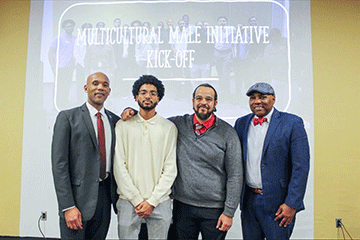 Escolastico was accompanied by two SUNY Cortland alumni mentors, Jacob Wright ’18, career services career coach and educator, and Kharmen Wingard M ’11, assistant director of the Educational Opportunity Program. James Felton III, the university’s former chief diversity officer, attended in a demonstration of support. According to recent Integrated Postsecondary Education Data System statistics, white males graduated within a six-year span at a rate of 64%, compared to 52% and 50% for Latino and Black males, respectively. At Cortland, MMI assigns upper-class members to mentor newer students for one internship credit, according to Escolastico and Wright. The student mentors provide their mentees with regular check-ins, serve as a source for advice and guide students to campus resources. Graduate students are welcome. “Having a mentor is one of the best things anyone can do for their professional and academic development,” Wright said. “In the program, you will build leadership skills, gain community and have fun. MMI will help you learn how to navigate Cortland and, more importantly, build a meaningful and successful life.” 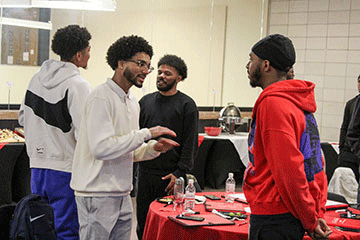 MMI also hosts events for professional development, educational opportunities and days to foster community around campus. The three co-founders of the new program hope it will continue to impact the campus community for years to come. They are working to have enough members to take trips to New York City, have conferences with schools across the state and have full-time staff. Escolastico encourages students to offer suggestions for potential future events and ways to increase membership and participation. Under its past leadership, MMI held many events, including a yearly Men of Color Student Leadership Summit. These events have attracted participants from 26 universities, high schools and church congregations. MMI’s positive campus community impact led to Cortland’s Institutional Equity and Inclusion Office winning the HEED award and the project was included as a reference for SUNY programs to improve diversity. 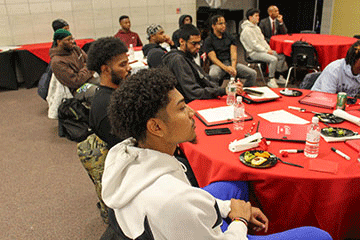 Under Felton, the MMI was created with the help of another student who has since graduated, Christopher Venant ’19. Escolastico has been carrying the torch since. He looks back on a time in his college career when he felt very lonely and discouraged and even considered transferring out. MMI gives him a way to help both himself and his classmates. “Do it out of love,” he said. “You have to love the people who look like you, who come from your culture, and if you’re going to be in a place where you’re the minority, you must stick together because you can’t fight those battles alone.” As the Student Government Association representative for a diversity club, “Know Your Roots,” that dissolved post-COVID, Escolastico is also an active member of most Cortland Voice Office clubs. He eventually wants to become a therapist, working with Black men and women and focusing on mental health counseling. He was introduced to the idea of the MMI while interning with Wright as a career peer mentor, helping Cortland students and alumni build resumes. Wright explained the program’s history and asked if he’d be interested in reviving it. Escolastico jumped at the opportunity. “James (Escolastico) has been invaluable to the revitalization of MMI,” Wright said. “Throughout his time at Cortland, he has built several relationships with others, which has helped build interest and engagement among our students.” Wright and Wingard, who co-chair the program, broke down MMI’s details for students, worked to garner alumni support, acquired funding and identified event locations. 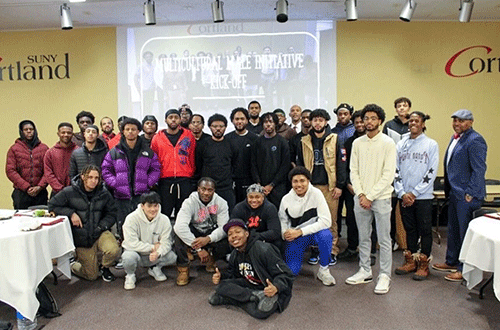 “A common theme that caused (Black students) to leave is a feeling of isolation and a lack of support/community,” Wright said, describing his own experience as a Cortland student. “This program addresses the lack of connection that men of color experience on our campus through mentorship.” Venant, now employed in New York City as a finance/real estate property accountant with First Service Residential and as a part-time DJ for private events, is proud that the renewed MMI is growing and evolving. “There’s not a lot of us,” Venant said of male students of color. “We had to make sure we leveraged the resources and the people (at Cortland) to their full capacity to truly be able to continue doing so even when we’re gone. “That's what MMI is about, the foundation of it: genuine connections from people that look and sound like us, trying to make a start in their own direction.” Prepared by communications writing intern Jean-Andre Sassine Jr. '23 Capture the MomentThere was no lion in sight as first week of March came in like a lamb, opening with 65 degrees and a sunny start to midterms week. The beautiful weather led many students to study outdoors as they made their final academic push before Spring Break. The break is next week, March 9 to 17. In Other NewsSUNY Cortland’s ESPN highlight gets assist from alumIt won’t show up in any box score, but you can credit Rob Galm ’17 with an assist on the recent Cortland basketball buzzer-beater that made late-night highlights on ESPN. Galm, a former communication studies major who’s now an Emmy Award-winning content producer for ESPN, continues to live out his childhood dream working for the worldwide leader in sports. His job involves orchestrating the network’s various late-night SportsCenter programs airing from Bristol, Conn., Washington, D.C. and Los Angeles. “I work on those shows on a nightly basis, so I have relationships with all of those producers and anchors,” said Galm, whose position is based at the network’s headquarters in Bristol. On Feb. 20, he received emails from Fran Elia, the university’s sports information director, and Jaclyn Lawrence ’12, M ’14, associate director of athletics, encouraging him to check out the dramatic finish from that night’s SUNYAC men’s basketball quarterfinals game against Plattsburgh. Cortland trailed by two points in the final seconds of overtime, when sophomore Kendall Arcuri connected on an improbable three-pointer at the buzzer. The ball bounced several times off the rim and backboard before delivering a 78-77 Red Dragons win and Corey Gymnasium court-storming from a raucous student crowd. Galm made sure the clip made its way to the right people at the network. It ended up airing on several different late-night programs and landing at No. 3 on SportsCenter’s top plays of the day. High-profile anchors including Linda Cohn and Scott Van Pelt even gave the team a shout-out. “It certainly could have made its way there without me, but I probably helped expedite the process and get it on the forefront of those shows,” said Galm, who has worked his way up through several promotions since earning a job as a production assistant at ESPN less than a month after he graduated from SUNY Cortland. He handles multiple duties in his late-night shift. Sometimes he oversees a team of production assistants and monitors a handful of night-time contests while tossing ideas to producers as action develops. Other nights, Galm works with guests or studio analysts joining SportsCenter programs. As “the eyes and the ears of the anchors,” he also works directly with stars like Van Pelt. “It’s definitely a strong relationship,” Galm said. “You work to establish that trust with anchors and that’s something I’ve definitely enjoyed in my new role — getting to pitch ideas directly to them and work with them while the show’s on the air.” During postgame press conferences after Super Bowl LVIII, for instance, Galm monitored remarks from San Francisco 49ers head coach Kyle Shanahan, looping in Van Pelt when a question about overtime decision-making came up. “I’m letting Scott know that he’s tossing to Kyle Shanahan on this specific topic,” Galm said. “He hasn’t heard the sound yet, so I help facilitate that.” In addition to multiple promotions, Galm’s work has been rewarded with two Emmy Awards as part of SportsCenter’s production team in the category of “Outstanding Studio Show – Daily.” But even while monitoring the biggest stars in sports, he remains plugged in to the success of Cortland athletics. Before Cortland’s football team earned its thrilling national championship in December, Galm suggested monitoring the game to the SportsCenter team. He eventually oversaw production of the highlight, identifying the game’s key plays that would air. “I had to ask producers for a little more time for the highlight because the game was so good,” he said. That passion for Red Dragon athletics started early during his time as a student. Galm, who grew up in Pine Plains, N.Y., has been longtime best friends with former men’s basketball players Justin Cooper ’19 and Zach Lydon ’19. As an undergraduate, he cherished hands-on outlets like CSTV, the university’s television station, and the Red Dragon Sports Network, the Athletics Department’s online streaming service. He said the latter experience was pivotal in his early development, introducing him to a variety of skills: broadcasting, editing, producing, directing and writing among them. Galm credited Jim Forshee, a sport management faculty member who recently passed away, for being instrumental in that initial success. “He really pushed me to try every single thing,” said Galm, also noting Forshee’s role in helping him land his first internship with the Albany Dutchmen, a collegiate summer baseball team. “All of those experiences made me more well-rounded so that when I got to ESPN, I was trained in a lot of different areas.” Galm said he is always happy to try and help land SUNY Cortland on a national stage when it’s possible. In addition to providing a formative education and lifelong best friends, the university helped introduce him to his future wife. This summer, he’ll marry Eryn Griep ’18, whom he met at Cortland, in nearby Marathon, N.Y. “Any time we can shed some light on Cortland and (Division III) athletics, it’s really cool,” Galm said. “I think it’s really cool to give back to a place that gave me so much.” Cortland professional named to statewide civic engagement initiativeJohn Suarez, director of SUNY Cortland’s Institute for Civic Engagement, has been chosen as a fellow for the State University of New York’s new Civic Education and Engagement and Civil Discourse Initiative. SUNY Chancellor John B. King, Jr. today announced that the inaugural class of 10 fellows will advance the 64-campus system’s commitment to civic engagement as an essential outcome of higher education. “SUNY is committed to being a place of inclusion and inquiry,” King said. “SUNY’s colleges and universities have long been bastions of civic engagement and civil discourse where students learn to become better, more engaged citizens as part of the path to academic achievement,” Suarez will work to promote civil discourse among students, faculty, and staff across campus communities while helping to implement an updated general education framework. When Suarez heard the announcement, he said he was humbled and honored, knowing who he would get to work with. “There are ten of us altogether who are on this fellowship,” said Suarez, noting the caliber of the other fellows. “They represent some heavy hitters from a variety of disciplines, so I'm really excited about joining this and participating in the work.” The chancellor cited Suarez’s “dedication to fostering civil discourse” as a major reason for his selection. "Each of the 10 fellows have extraordinary accomplishments and their collective experiences will help ensure SUNY continues to lead in promoting civic engagement across the system and inspiring generations of socially responsible SUNY graduates,” King said. 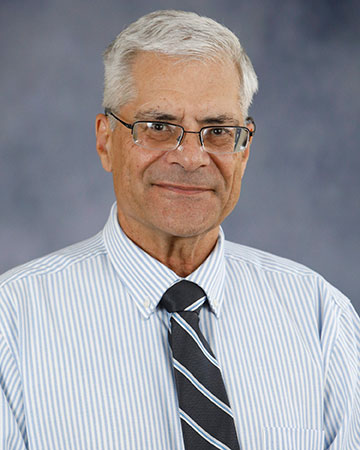 Through Cortland’s own Institute for Civic Engagement, Suarez leads projects including Dragons For Democracy, the school’s Action Team Interns, and the Leadership in Civic Engagement and Leadership in Democracy Engagement awards, which encourage students, staff, faculty and the wider community to listen, learn and volunteer. “I'm proud of the folks that I work with that include not only faculty and staff but also students, many of whom are deeply engaged and addressing challenges that we face,” Suarez said. Suarez, whose department also helped begin the SUNY Cortland Cupboard food pantry, said that, at Cortland, what sets civic engagement apart is learning by doing. “The key here is that with volunteering, there's not necessarily any intentional learning,” Suarez said. "But, with reflection, we can learn." As an example, he noted that he once helped pack sandbags to prevent flooding on a lake. Suarez knew he was helping but realized that, without reflecting, he wasn't learning about the situation itself. “I'd go back to my apartment and have lunch or dinner without thinking about why people are putting their homes there. What's going on with insurance? What might be what's going on climate-wise that might be contributing to this? I wasn't thinking about that. I wasn't learning anything about that. As opposed to civic engagement ... that means, essentially, learning by doing.” According to research conducted by the American Association of Colleges and Universities, civic engagement by college students has led to improved graduation and retention rates. It can increase career-related skills that set students up for success upon graduation, as well as an increase in social responsibility. As a fellow, Suarez looks forward to helping the SUNY system and its campuses incorporate ideas that encourage listening to and understanding different viewpoints, both in and out of the classroom. He’s taken similar steps at Cortland by working with Associate Professor Jill Murphy, chair of the Health Department, to found a campus chapter of the Heterodox Academy, a nonprofit with the goal of using open inquiry, viewpoint diversity, and constructive disagreement to bolster higher education and academic research. Suarez noted that other resources like the American Democracy Project are on campus to encourage civic learning and acceptance of different points of view. “That has drifted away from our educational system from K through 16 and past that,” Suarez said. “It's also something that has drifted away from our culture. Not only campus culture, but culture across our country.” Suarez encouraged anyone interested in contributing to the community to learn about local not-for-profit agencies and become a board member, attend city council meetings to learn about local issues or to reach out to the Institute for Civic Engagement. “This is who we're supposed to be as a public institution,” Suarez said. “Not only for the purpose of having students learn how to learn and enjoy learning. Not only for the purpose of students being able to develop technical and transferable skills that they can apply in their professions. But also, to have them develop the motivation to use those skills in civic decision making, address whatever the challenges might happen to be and, at the same time, be open to other ideas.” Students determine fate of European nations. Sort of.The fate of European Union countries appeared to rest in the hands of 10 SUNY Cortland students for three days in Belgium during January, when they simulated ministers and diplomats trying to settle real-world issues as part of Global Model European Union (MEU) 2024. From Jan. 7 to 10, Cortland’s student contingent — embedded with 110 total American and European student delegates — settled timely matters relating to Russia’s wars in Ukraine and Moldova, managed mass migration into EU countries, addressed EU’s environmental concerns in the Arctic, and ironed out particulars on the European Union’s role in the Indo-Pacific Region. The host campus — located in the same city as the actual European Union — was the Brussels School of Governance, Free University of Brussels. Participants included students from 11 universities in seven countries: Belgium, Bulgaria, France, Germany, Romania, United Kingdom and the U.S. Junior history major Joshua Bates of Rome, N.Y., portraying the government head of Croatia, quickly learned to curtail hours of fruitless circular verbal exchanges inside a small college conference room simulating an EU meeting room. Instead, in a hallway outside, he worked out a solution with a fellow delegate from another American university. Between them, they cut a deal, started a motion to end debate and executed a successful vote. 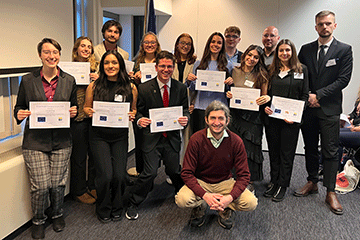 “Our motion was adopted that day. It all happened quite quickly,” said Bates, who is minoring in political science and international studies, and has his eyes on law school and a future as a prosecutor, public defender or government official. “That kind of speaks to what the larger EU is about,” Bates said. “You didn’t speak on your own behalf. You developed an alter ego. What policies would be best for that country?” This is the first time since January 2020 — the start of the COVID-19 pandemic — that SUNY Cortland students got the chance to travel abroad to participate in the annual hands-on experiment in governmental negotiation and diplomacy, which traditionally has involved participants traveling to either New York City or Brussels. This year, the Global Model EU 2024 leaned into the following timely issues: the European Council negotiated EU policy regarding Ukraine and Moldova; the Council of Foreign Affairs focused on the EU role in the Indo-Pacific Region; the Environmental Council addressed EU policy in the Arctic region; and Justice and Home Affairs dealt with migration issues. Heads of state moved smoothly in between the four settings. “This was an experiential learning opportunity for the students to put in practice their negotiation skills and international relations, European Union and historical knowledge skills,” said History Professor Scott Moranda. Moranda co-organized and accompanied the students in the SUNY Cortland delegation with Alexandru Balas, professor and coordinator of the International Studies Program and director of the Clark Center for Global Engagement. Moranda also coordinates the university's Project for Eastern and Central Europe. “They got to test their skills and knowledge in the company of approximately 110 students,” Moranda said. Besides SUNY Cortland and four other American universities, the simulation included the American University of Bulgaria, the Universite de Lille (France), University of London Institute in Paris, Brussels School of Governance in Belgium, Babes-Bolyai University in Romania, and Schmalkalden University in Germany. 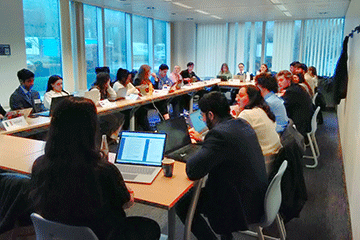 Additionally, several student participants played the role of the press, interviewing participants before the conference, asking questions during the press briefings, and producing a “newspaper” during the conference that highlighted the formal and informal negotiations. Emma Efing of LeRoy, N.Y., who graduates this spring with a dual major in adolescence education in social studies and in history, served the Model EU as Germany’s minister of environmental affairs. “Some key things this entailed was researching Germany’s goal for preserving the Arctic Circle and its environment and being able to negotiate for the rights of indigenous people in the Arctic Circle. Another important aspect of my negotiations was concerning the black carbon emissions and how much they should be reduced by and how fast.” Model EU helped her learn how best to negotiate in a real-world environment. “Learning how to find allies and negotiate compromises based on research and what would be best for Germany was a learning curve, but it made me a more confident person in my speaking skills and in my knowledge,” Efing said. This Model EU foray has inspired her to plan a gap year after graduation of traveling across Europe to identify the perfect historical niche for her future graduate studies. “I got to meet and befriend people from other countries and cultures, which made me realize how big and yet how connected the whole world is,” Efing said. “Being able to connect to others, do research and find a digestible way to present and talk about my research will help in my goals of being a teacher or a museum equivalent of a teacher.” As the foreign minister of Germany, Sarah O’Connor of Commack, N.Y., a senior international studies major who is concentrating in global political systems, negotiated policies concerning the Indo-Pacific region’s relations with the EU. “I learned the significance of effective communication and coalition-building in achieving diplomatic objectives and the importance of understanding diverse perspectives and interests when negotiating complex international issues,” O’Connor said. Once she graduates in May, O’Connor’s immediate plan is secure a job with the federal government in Washington, D.C. “I want to pursue a career in defense and military policy,” she said. Layla Myers of Brockport, N.Y., headed Netherlands in the simulated delegation. “The Brussels trip aims to simulate real negotiations, which consist of a lot of socializing and communication, not only in the conference room but before, during and after,” said Myers, a junior international studies major with a concentration in culture and global development. She plans to use her degree to create a better future for youth by advocating for issues just like the ones debated in the simulation. “This experience allowed me to feel what it would be like to really make a difference in our world today; it also showed me what it takes to do so,” she said. During their time abroad, participants visited the European Union Parliamentarium to learn about the important work of the European Parliament representing the EU citizens; and the House of European History. They also received briefings from EU officials. The EU Parliamentarium was located right next to the actual thing, Bates noted. “It’s something I think we should have in the U.S.,” he said. 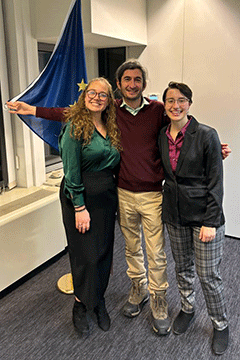 Finally, the Cortland contingent traveled to Brugges to explore the medieval town which is studied in-depth in several international studies and history courses at SUNY Cortland. The SUNY Cortland students who participated also included: international studies majors Victoria Quick, a senior from Hurley, N.Y., Asha Younas, a junior from Woodside, N.Y., Donald Bosman, a junior from Endicott, N.Y., and Anthony Fridlikh, a senior from Staten Island, N.Y.; outdoor recreation major Savannah Adami, a junior from Albany, N.Y.; and community health major Ava Graziano, a junior from Washingtonville, N.Y. Also joining the SUNY Cortland delegation were Andrada Rat, a 2023 SUNY Cortland exchange student from Cortland's international, institutional partner Babes-Bolyai University in Cluj-Napoca, Romania; and her university colleague, Vlad Farcas. Once again managing the Model EU were co-directors Juan Arroyo from Ithaca College and Giulia Tercovich of the Brussels School of Governance; with help from Michelle Benson-Saxton and Collin Anderson at University at Buffalo, Alexandru Balas at SUNY Cortland and Zakhar Berkovich at SUNY Albany. Organizers also credit the support of SUNY Cortland’s Sue Pettitt from the Clark Center for Global Engagement; Tina Russell, Cortland Auxiliary accountant; Joseph Fitzgerald, Auxiliary Services controller; and Daniel Condon, Campus Store director. The participation of the students was made possible by generous contributions from the International Programs Office, the Dean of Arts and Sciences Office from the Myers Family Fund, the History Department, the Haines Fund, and the Clark Center for Global Engagement. Next year’s Global Model European Union will run from Jan. 6 to 9 in New York City. TOP IMAGE: All Global Model EU participants and faculty members converged on a staircase inside the Brussels School of Governance, Free University of Brussels. Campus plans Women’s History Month seriesDuring Women’s History Month in March, SUNY Cortland plans a series of events on the theme of “Women Who Advocate for Equity, Diversity and Inclusion.” “The theme celebrates women everywhere in the world who have worked for a future where bias and discrimination have no place,” said this year’s Women’s History Month coordinator, Bekeh Ukelina, history and Africana studies professor and director of the university’s Center for Gender and Intercultural Studies. Women’s History Month events, which start on Tuesday, March 5, will celebrate local heroines, both past and present, who blazed a trail for progress, he said. Their tireless efforts secured stronger protections, policies, and laws that champion equality. Following decades of discrimination, the university is proud to celebrate women who work for basic inclusion, equality and fairness. “Speakers were carefully selected to not just spark discussion but ignite action on the critical socio-political factors shaping women’s lives,” Ukelina said. “This year’s line-up will provide a global perspective, addressing gender issues in both the north and south.” Lectures, a film screening and information tables are free and open to the public.
Following Spring Break, which runs from March 11 to 15, the following talks are planned:
Co-sponsors for Women’s History Month include the Center for Gender and Intercultural Studies (CGIS), Institutional Equity and Inclusion Office, Chemistry Department, Diversity, Equity and Inclusion Committee, President’s Office, the Cultural and Intellectual Climate Committee and the Anthropology/Sociology Department. Crime does pay for mystery authorOver the last decade, the former “Voice of Red Dragon Football” has expressed himself as a dark storyteller, self publishing some 40 thriller and mystery books. That means Dan Padavona ’91, who left a career in meteorology to thrive in the world of fiction, writes a complete novel roughly every three months. “I never imagined making a living off my writing,” Padavona said. “I just wanted to entertain people, to show something to my friends and family.” Most of Padvona's books are set in the Finger Lakes. That makes sense because this Cortland, N.Y., native is the adopted son of heavy metal music icon Ronnie James Dio, a Cortland legend. 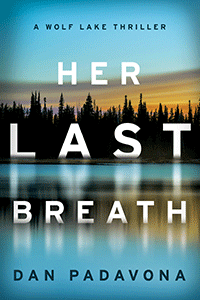 Fictional towns in the region were the setting for Padavona's Wolf Lake series, which featured a detective with autism. The setting's the same region for his latest series, which kicks off with a new mystery suspense thriller coming out at the end of March, Secrets Never Sleep. “That’s the first book in the new (P.I.) Nia Carter series, based in a fictional Finger Lakes town,” Padavona said. “It’s set in our area, which is going to be a lot of fun.” At SUNY Cortland, the former broadcast communications major was dubbed the “Voice of Red Dragon football”’ on WSUC-FM, where he also was sports director, music director and summer station master. “That was like playtime for me, standing there with a microphone and calling a football game that everyone in Cortland wanted to be at,” he said. That was when the station had just begun to cover the sport, Padavona said. The aspiring broadcasters watched a mediocre team of 1987 metamorphosize into a powerhouse that captured some of the greatest Cortaca Jug games ever played, the 1988 Game of the Century at Davis Field, and the rematch on South Hill in the Eastern Region final. “I had a love for telling stories,” said Padavona of his youth. “I never imagined it would be something I would do later in life.” After graduation, Padavona followed another passion: weather. He earned a degree in meteorology from SUNY Oneonta and had a successful first career from 1994 to 2021 with the National Oceanic and Atmospheric Administration (NOAA) National Weather Service. “Although I enjoyed my job, something was eating at me that I wasn’t creating, wasn’t doing something I loved,” he said of turning 46 and trying creative writing again. In 2014, he wrote Storberry, a vampire tale that pays homage to Stephen King’s Salem’s Lot. “I had a little following, but it was just enough money for buying pizza on a Friday night,” he said. “I used to joke with my wife (Teresa “Terri” Musci Padavona ’92, M ’96), that if I ever got to the point that my earnings ever replaced my income with the National Weather Service, I’d just retire. “It took a lot of time and self-sufficiency, and I would get home from work and want to relax but I would have another chapter to write.” 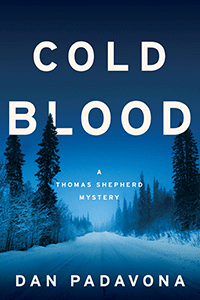 Things started to change in late 2018 to early 2019 with his Scarlett Bell FBI series, which somewhat resembled the “Criminal Minds” TV show. Then he released another book, Dark Water Cove, and the Wolf Lake series, which were set in the Finger Lakes. “I went from making next to nothing to all the sudden my (day job) income was matched by writing income,” he said. “I had this one Wolf Lake series that people would read, and it just brought a lot of other people into the fold. When my older books started to sell, it just put me over the edge.” Months later, earning twice as much from book sales as from meteorology, Padavona gave notice to NOAA. “By the time I walked out the door on Sept. 12, 2021, my income was triple what it was in my government job,” that is, $300,000, said Padavona, who still chases and photographs severe weather events as a hobby. “I think it would have hurt my career if I had stayed. I had more time to write and devote to creativity.” At 55, Padavona writes and edits his manuscripts for about two hours a day and works on marketing his work for another hour, promoting his newsletter and answering fans’ emails. “After that, I really have the rest of the day to myself. It’s a blessing. I get to do the things I never could in a structured work environment. I didn’t miss a single Cortland State football game last year.” Padavona said he has become a student of things he didn’t go to school for, like the criminal profile. “I need to know enough about crime to be dangerous,” Padavona said. “I don’t have to be an expert in it, but you do have to read up and research on forensic sciences and police procedure, so you at least know what you’re writing about and can create as much realism as possible.” On the other hand, “at the end of the day, people go to these books because they want a story,” he said. “They want to escape. The people who would get upset about not everything being exactly right are probably just a few.” Padavona, who’s moving to his dream location in Ithaca, N.Y., next year after Terri retires from teaching middle school Spanish in Vestal, said his secret to success is taking his second career seriously. Padavona self-publishes. But after his own careful proofreading, he turns the manuscript over to a professional editor to catch more typos, plot omissions and character development problems. From his website, he sells courses for aspiring novelists, Let’s Sell Your Book and Sell your Books Now/Amazon Ads Liftoff. “Something I teach in my course is that you can’t be a serious self-published author if you don’t do all the things that traditionally published authors do, and that includes having an editor and a good proofreader,” he said. Just before publishing, a few trusted confidants give a final read-through. “I think that in order to survive in any creative endeavor, you have to have entrepreneurship,” he said. “It’s not enough to be a great painter or singer or writer. Eventually, somebody must find out who you are.” IMAGE AT TOP: Dan Padavona '91 and Teresa "Terri" Musci Padavona '92, M '96 relax at Taughannock Falls State Park, in a region where many of Dan's dark thrillers and mysteries occur. SUNY Cortland extends admission deadlineSUNY Cortland has extended its deadline for accepted students to commit to attend by paying their deposit for the fall semester until June 1, due to processing delays related to new federal financial aid forms. The additional month gives students extra time to figure out their budget to make sure Cortland is the perfect fit, said Director of Admissions Jose Feliciano. The change is consistent with SUNY Chancellor John King’s guidance for SUNY campuses to extend the universal deadline from May 1 until at least May 15 to make sure families have accurate financial aid information before making a final decision. In December, the U.S. Department of Education unveiled a new, streamlined FAFSA (Free Application for Federal Student Aid) form for this year — leading to significant delays for students, families and campuses to receive information needed to create financial aid packages. Although the deadline for submitting deposits has been extended, students who know they want to attend SUNY Cortland in the fall regardless of financial aid are urged to commit soon. Cortland received a record number of applications this year, and securing a spot earlier can be advantageous in selecting campus housing or registering for an early orientation session. Cortland to Host Elmira in NCAA Women's Hockey First Round WednesdayThe Cortland women's ice hockey team has earned a spot in the 11-team NCAA Division III tournament and will host Elmira College in the opening round on Wednesday, March 6, at 7 p.m. at Alumni Arena. Cortland men's hockey to play in NCAA first round SaturdayThe Cortland men's ice hockey team has earned a spot in the 13-team NCAA Division III tournament and will travel to Plymouth State University in New Hampshire for the opening round on Saturday, March 9, at 7 p.m. The Cortland men's ice hockey team has earned a spot in the 13-team NCAA Division III tournament and will travel to Plymouth State University in New Hampshire for the opening round on Saturday, March 9, at 7 p.m.  Suggest a feature story Suggest a feature story
Faculty/Staff ActivitiesBrian BarrettBrian Barrett, Foundations and Social Advocacy Department, had his book, Basil Bernstein: Code theory and beyond, published by Springer. Teagan BradwayTeagan Bradway, English Department, was awarded a Hunt-Simes Visiting Junior Chair of Sexuality Studies with the Social Sciences and Humanities Advanced Research Centre at the University of Sydney. In February, she traveled to the University of Sydney and taught a seminar on “Queer Relationality” as part of the Hunt-Simes Institute for Sexuality Studies, which ran from Feb. 19 to March 1. Kyle CannonKyle Cannon, Campus Activities and Corey Union, attended the National Conference of the Association for the Promotion of Campus Activities, which was held Feb. 15 to 18 at the Hershey Lodge and Convention Center in Hershey, Pa. Kyle, in addition to his capacity as advisor to the Student Activities Board delegates, he worked at the conference as an event crew coordinator, leading a group of 28 student volunteers from SUNY Cortland and a number of other colleges and universities who were tasked with assisting session presenters and stamping programs for educational sessions and showcases, handing out conference swag and raffle tickets, and working and setting up the lunch and dinner showcases. In addition, the SUNY Cortland Student Activities Board was bestowed the National Boyd Jones Programming Board of the Year Award for their contributions to the SUNY Cortland campus and the Association for the Promotion of Campus Activities community. Christopher GascónChristopher Gascón, Modern Languages Department, wrote and recorded a song inspired by Cortland’s common read, Braiding Sweetgrass, by Robin Wall Kimmerer. The single, “Hold On,” was released in February 2024 and can be heard on Spotify and other music streaming services under artist name Juniper Salute. David A. KilpatrickDavid A. Kilpatrick, professor emeritus of psychology, was invited by the National Association of School Psychologists to present two half-day workshops for their annual conference in New Orleans on Friday, Feb. 16. The workshops were titled “Intervention-Oriented Assessment of Reading Difficulties” and “Interventions for Difficulties with Word Identification, Fluency and Reading Comprehension.” In addition, he participated in a research presentation, “Exploring Reading Fluency as a Function of the Orthographic Lexicon” with co-presenters Michelle Storie, Ph.D., from SUNY Oswego, Vincent Alfonzo, Ph.D. from Montclair University and Daniel Hajovsky, Ph.D. from Texas A&M.  Submit your faculty/staff activity Submit your faculty/staff activity
|
The Bulletin is produced by the Communications Office at SUNY Cortland and is published every other Tuesday during the academic year. Read more about The Bulletin. To submit items, email your information to [email protected]
© 2026 SUNY Cortland. all rights reserved.